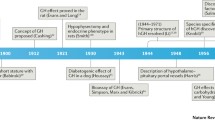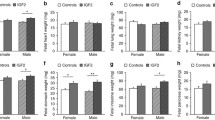Abstract
Growth hormone (GH) and insulin-like growth factors (IGFs) are essential for normal growth and development during embryonic stages as well as postnatally. While GH has little effect on these processes prenatally, the IGFs are important during these stages. On the other hand the GH-IGF-I axis is important for pubertal growth. To determine whether postnatal growth and development are dependent on circulating or locally produced IGF-I, we deleted the IGF-I gene in the liver using the cre/LoxP system used for tissue-specific gene deletion. These animals demonstrated approximately 75%–80% reduction in circulating IGF-I and an approximate fourfold increase in circulating GH. Despite the marked reductions in circulating IGF-I, growth and development was apparently normal. Thus the original somatomedin hypothesis needs to be re-evaluated in the light of these new findings.
Similar content being viewed by others
Author information
Authors and Affiliations
Additional information
Received: 5 September 1999 / Revised: 11 December 1999 / Accepted: 18 December 1999
Rights and permissions
About this article
Cite this article
Yakar, S., Liu, JL. & Le Roith, D. The growth hormone/insulin-like growth factor-I system: implications for organ growth and development. Pediatr Nephrol 14, 544–549 (2000). https://doi.org/10.1007/s004670000363
Issue Date:
DOI: https://doi.org/10.1007/s004670000363




